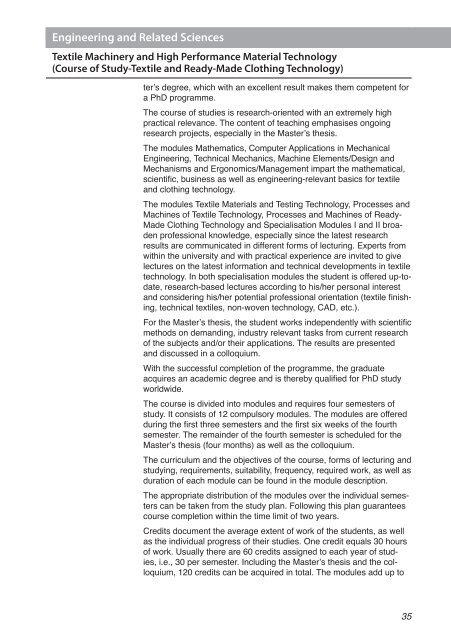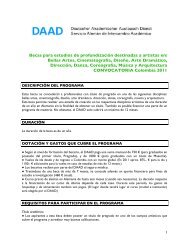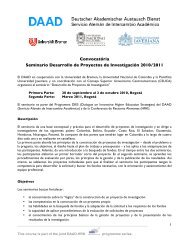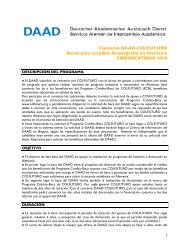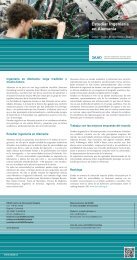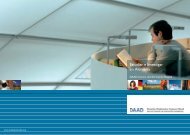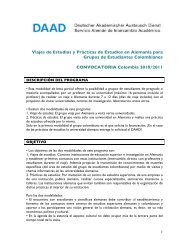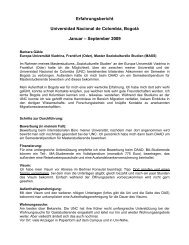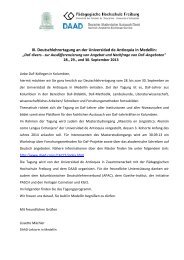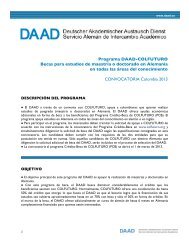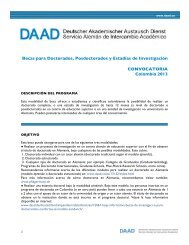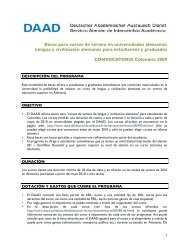Becas de Posgrado dirigidas a Profesionales de PaÃses en ... - Daad
Becas de Posgrado dirigidas a Profesionales de PaÃses en ... - Daad
Becas de Posgrado dirigidas a Profesionales de PaÃses en ... - Daad
Create successful ePaper yourself
Turn your PDF publications into a flip-book with our unique Google optimized e-Paper software.
Engineering and Related Sci<strong>en</strong>cesTextile Machinery and High Performance Material Technology(Course of Study-Textile and Ready-Ma<strong>de</strong> Clothing Technology)ter’s <strong>de</strong>gree, which with an excell<strong>en</strong>t result makes them compet<strong>en</strong>t fora PhD programme.The course of studies is research-ori<strong>en</strong>ted with an extremely highpractical relevance. The cont<strong>en</strong>t of teaching emphasises ongoingresearch projects, especially in the Master’s thesis.The modules Mathematics, Computer Applications in MechanicalEngineering, Technical Mechanics, Machine Elem<strong>en</strong>ts/Design andMechanisms and Ergonomics/Managem<strong>en</strong>t impart the mathematical,and clothing technology.The modules Textile Materials and Testing Technology, Processes andMachines of Textile Technology, Processes and Machines of Ready-Ma<strong>de</strong> Clothing Technology and Specialisation Modules I and II broa<strong>de</strong>nprofessional knowledge, especially since the latest researchresults are communicated in differ<strong>en</strong>t forms of lecturing. Experts fromwithin the university and with practical experi<strong>en</strong>ce are invited to givelectures on the latest information and technical <strong>de</strong>velopm<strong>en</strong>ts in textiletechnology. In both specialisation modules the stu<strong>de</strong>nt is offered up-todate,research-based lectures according to his/her personal interesting,technical textiles, non-wov<strong>en</strong> technology, CAD, etc.).methods on <strong>de</strong>manding, industry relevant tasks from curr<strong>en</strong>t researchof the subjects and/or their applications. The results are pres<strong>en</strong>tedand discussed in a colloquium.With the successful completion of the programme, the graduateworldwi<strong>de</strong>.The course is divi<strong>de</strong>d into modules and requires four semesters ofstudy. It consists of 12 compulsory modules. The modules are offeredsemester. The remain<strong>de</strong>r of the fourth semester is scheduled for theMaster’s thesis (four months) as well as the colloquium.The curriculum and the objectives of the course, forms of lecturing andstudying, requirem<strong>en</strong>ts, suitability, frequ<strong>en</strong>cy, required work, as well asduration of each module can be found in the module <strong>de</strong>scription.The appropriate distribution of the modules over the individual semesterscan be tak<strong>en</strong> from the study plan. Following this plan guaranteescourse completion within the time limit of two years.Credits docum<strong>en</strong>t the average ext<strong>en</strong>t of work of the stu<strong>de</strong>nts, as wellas the individual progress of their studies. One credit equals 30 hoursof work. Usually there are 60 credits assigned to each year of studies,i.e., 30 per semester. Including the Master’s thesis and the colloquium,120 credits can be acquired in total. The modules add up to35


